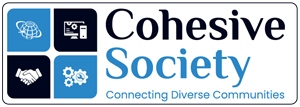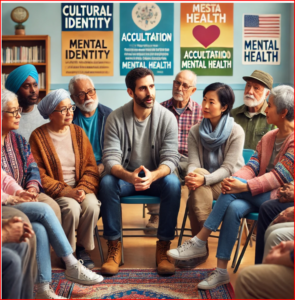In today’s multicultural Britain, adolescents from diverse ethnic backgrounds navigate a complex interplay between their heritage and the dominant British culture. This process of acculturation—adjusting to a new cultural environment while maintaining one’s original identity—profoundly influences their mental health. The challenges of cultural adaptation, discrimination, and identity conflict often impact the well-being of young individuals, making it essential to provide structured support systems that foster positive mental health outcomes.
At Cohesive Society, we recognize the intricate relationship between cultural identity and mental health, particularly within the Bangladeshi, South Asian, and other migrant communities in the UK. Understanding how adolescents cope with these challenges is crucial in ensuring their mental and emotional well-being.
Cultural Identity and Its Role in Mental Health
For adolescents growing up in a multiethnic society, cultural identity is a key aspect of their psychological development. A strong sense of cultural belonging can enhance self-esteem, provide emotional security, and serve as a protective factor against mental health disorders such as anxiety and depression. However, when cultural identity is challenged—whether through social exclusion, racial discrimination, or pressure to assimilate—it can create significant emotional distress.
Studies show that bicultural identity, where individuals integrate their heritage and the dominant culture, improves mental health outcomes. Adolescents who balance both aspects of their identity tend to have higher self-confidence and resilience. Conversely, those who experience marginalization or are forced to suppress their cultural roots may suffer from identity confusion, leading to stress, anxiety, or even social withdrawal.
Acculturation and Psychological Stress
Acculturation can be a double-edged sword for young people. On the one hand, adapting to mainstream British culture helps them feel a sense of belonging in their schools and social circles. Conversely, conflicts may arise when traditional family values clash with Western norms. For example, many South Asian adolescents face challenges when navigating family expectations around education, career choices, and social behaviours, which may not always align with their personal aspirations or peer influences.
This internal conflict often leads to heightened stress and can sometimes result in mental health disorders. Adolescents who feel caught between two cultures may experience acculturative stress, where they struggle with identity loss, discrimination, and the pressure to conform. Research indicates that ethnic minorities facing acculturative stress are at a higher risk of developing depression, eating disorders, and substance abuse.
The Role of Community Support and Interventions
To foster a sense of belonging and emotional well-being, providing culturally sensitive mental health support is essential. Schools, community organizations, and mental health services must implement initiatives acknowledging cultural differences while promoting inclusion. Cohesive Society actively works with ethnic minority communities in Northampton to address these issues through culturally tailored interventions, including:
- Mentorship and Peer Support Programs: Connecting adolescents with role models from similar backgrounds can help them navigate identity challenges and develop coping mechanisms.
- Family and Community Engagement: Encouraging open dialogue between parents and children about cultural expectations can reduce generational conflict and create a supportive home environment.
- Mental Health Awareness and Counseling Services: Providing culturally competent mental health resources ensures adolescents can access professionals who understand their unique struggles.
- Educational Workshops: Schools and community centres should offer programs that educate young people about acculturation challenges and equip them with resilience-building strategies.
Moving Towards an Inclusive Future
The mental health of adolescents in multiethnic communities should be a priority for policymakers, educators, and community leaders. Cohesive Society believes cultural diversity should be celebrated rather than seen as a barrier to well-being. By promoting a sense of belonging and understanding, we can help young people embrace their identities with confidence and reduce the stigma surrounding mental health in ethnic minority communities.
A more inclusive society is one where every young person feels valued, heard, and supported regardless of cultural background. Through collective efforts, we can create a future where mental health disparities among ethnic minority adolescents are addressed, ensuring they have the resources and resilience to thrive in an increasingly diverse Britain.



